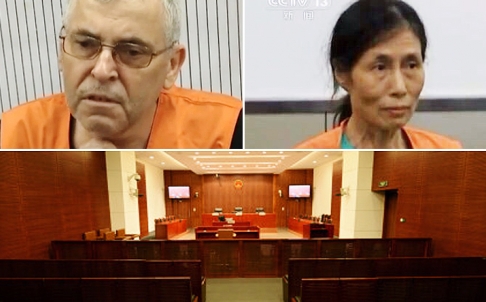On his Chinese Law Prof blog, Donald Clarke provides a detailed analysis of the transcript of the trial of Peter Humphrey and Yu Yingzeng, which was posted on the Shanghai No. 1 Intermediate Court’s weibo feed. Humphrey and Yu were charged with illegally obtaining private information as part of their work with China Whys, their corporate investigation firm, and sentenced to two and a half and two years respectively.
Clarke emphasizes that his observations are preliminary as he had not yet had access to several of the other documents from the trial. However, he found that the facts in the case did not justify the prosecution, and that the prosecutors failed to define what counts as an illegal method of information collection:
Elsewhere, though, the defense made what to me seem to be astonishing concessions. Zhai Jian states, “The acts of the defendants in this case are unlawful, because neither individuals nor commercial entities have the right to obtain citizens’ personal information about their families, their entering and leaving the country, and their mobile phone communications via the method of paying for it.” He goes on to say that in pre-trial conferences with the defendants, he has ascertained that in their own countries, information on entering and leaving the country as well as mobile phone communications are considered strictly private, and “therefore the defendants’ collecting of such information is unlawful.”
This argument seems questionable in a number of respects. First and most obviously, what other countries do cannot determine Chinese law, although obviously it bears on whether the defendants thought they were doing something wrong. Second, this statement conflates the issue of what counts as personal/private information with the issue of whether collecting it is unlawful. Art. 253 criminalizes only the unlawful collection of citizens’ personal information, so deciding that something should be considered personal information does not end the inquiry into criminal liability.
Third, and most important, Zhai is as silent as the prosecution on the source for his statement about the applicable law. It is sometimes said in jest that in China, everything not specifically permitted is forbidden, but this really is nothing more than a jest. No legal system could possibly function this way. Chinese law does not specifically permit any of the million actions we take every day, from brushing our teeth to watching Korean soap operas; this does not make us criminals. A statement that it is unlawful to do something needs support. Again, if Zhai and the prosecution are right about this, China is awash in criminals whose offenses are far worse than those of Peter Humphrey. [Source]
Read more about Humphrey and Yu’s case, via CDT.








